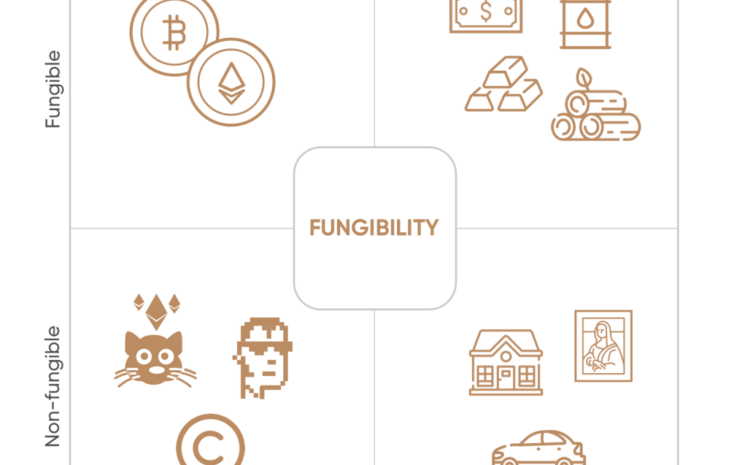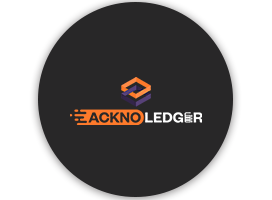
Decoding Non-Fungible Tokens?
In simple terms, a non-fungible token (NFT) could be understood as a one-off kind, non-divisible representation of any digital art form (e.g., collectible, artwork, or personalized game assets). The ownership of NFT is recorded on a blockchain to show its authenticity. NFT’s are inherently produced to be rare, and the value of a particular NFT is also based on its rarity. Since the NFT cannot be exchanged with any other NFT, it becomes non-fungible, giving it a unique feature and high value. Non-fungible items are not easily exchangeable for other things of the same value and type. Therefore, non-fungible items, as well as the value associated with them, are unique. NFTs utilize token standards supported by blockchains such as Ethereum, Algorand, and Solana.
 While the NFT’s are presently used for digital art, collectibles, and gaming assets, their use cases are tested for various purposes. Some of the other uses cases for which NFTs are being tested include product authentication, medical records and identity verification, digital finance, and many more are being discovered every day. NFTs leverage the inherent characteristics of Distributed Ledger Technology (DLT) to introduce scarcity and enable demonstrable exclusive ownership to digital information assets
While the NFT’s are presently used for digital art, collectibles, and gaming assets, their use cases are tested for various purposes. Some of the other uses cases for which NFTs are being tested include product authentication, medical records and identity verification, digital finance, and many more are being discovered every day. NFTs leverage the inherent characteristics of Distributed Ledger Technology (DLT) to introduce scarcity and enable demonstrable exclusive ownership to digital information assets
Separating apples and oranges from NFT’s basket
An NFT consists of two major components, which every buyer must understand before they put in their money to buy one for themselves. NFT’s are digital assets that provide a database on a distributed ledger giving details about the actual asset (the digital artwork, collectible, music, or video asset) through the metadata. Usually, it provides detail about the name of the asset or NFT, the smart contract address that regulates the transferability and ownership of the NFT, and the asset associated with the NFT. However, it is interesting that the metadata does not usually contain the asset but an address that takes the owner to the actual asset.
The asset is generally stored on other forms of decentralized and distributed file storage systems (DFSS) provided by various service providers. The reason to keep the associated asset on a DFSS is to enable faster peer-to-peer trading of NFT’s as the associated asset could consume more data storage. It further helps in keeping the associated asset on a neutral platform since the asset would not change with the change of ownership.
What is in it for me?
Now that NFT has been established as an asset, it becomes necessary for the buyers to understand their associated rights by buying the NFT from the marketplace or minting it. Unfortunately, the marketplaces often do not specifically mention the rights associated with the purchase of NFT’s. While some creators and marketplaces provide the utilities of NFT’s, the actual right associated with the digital asset, such as monetization, reproduction, and other such intellectual property rights, are not provided in detail to the buyers.
The purchase of NFT gives authentication to the purchaser that they are the owner of the NFT; in simpler terms, it’s a certificate of ownership of the NFT and not the rights associated with the same. So while anyone can download the image or any other form the NFT is represented, they don’t have the underlining authentication of their ownership of the NFT.
While the existing law makes it possible to transfer the IPR associated with the NFT, it requires the same in writing in a traditional form of the assignment agreement. The NFTs and crypto industry is still in their development stage. It is yet to be seen from any regulator or judicial authority to recognize the assignment of IPR through smart contracts. Further, as mentioned above, the NFT is nothing but metadata that regulates the transferability and ownership of NFT; the law does not protect it as it fails to fulfill the necessary requirements. Therefore, it is suggested that the marketplace or the creators of NFT’s give a detailed overview of the rights associated with the NFTs to the buyers, which will help the buyers make an informed decision and remove the unnecessary confusion around the associated rights.
Intellectual Property Rights and NFT’s
As mentioned above, the buyer does not necessarily get the proprietary rights of the associated asset of NFT but only the ownership of a particular copy of the NFT in from of metadata authenticating the buyer’s ownership. Therefore, despite the sale of NFT’s, the creator or owner of such associated assets would continue to have the proprietary right over the associated asset. For example, Larva Labs as a creator of Cryptopunks, owns the exclusive right to reproduce, modify, monetize and distribute cryptopunks; on the other hand, the buyer cannot print the cryptopunk on a t-shirt, coffee mugs, create action figures, or any other form and start monetizing by it.
Copyright
As the original creator of any copyrightable material, in terms of Section 14 of the Copyright Act, 1957, the owner possesses the right to reproduce, issue copies, perform the work in public and modify the copyrighted work. The buyer of NFT receives a copy of the copyrighted work and the NFT, which is a digital authentication of ownership of the NFT and not the underlining asset owned by the original creator. Therefore, the buyers must understand the associated rights while purchasing any NFTs. It is equally essential for the sellers to indicate in simple terms what the buyers can and cannot do with the NFTs they are selling.
 Illustration: Cryptokitties license allows its owners to monetize the NFT to the extent of 100,000 USD per year and not more than that. Further, NBA TopShots allows its “moments” owners to use, copy and display the moment but will enable them to reproduce, distribute, or otherwise commercialize the same.
Illustration: Cryptokitties license allows its owners to monetize the NFT to the extent of 100,000 USD per year and not more than that. Further, NBA TopShots allows its “moments” owners to use, copy and display the moment but will enable them to reproduce, distribute, or otherwise commercialize the same.
It is understood that any unauthorized reproduction, distribution, or monetization of NFTs by the buyer or anyone else would be considered copyright infringement and entitle the original creators to claim compensation and damages for the same. Though it is easy to locate the wallet of the owner of NFT through the blockchain ledger, it is often seen that finding the true identity of the wallet holder is difficult because of the anonymity maintained by the wallet service providers. It, therefore, becomes imperative that the service providers in the crypto and blockchain industry have a strong know your customer (KYC) compliance to protect the rights of everyone in the industry. Further, a robust public take-down notice would help the original creators to prevent copyright infringement and associated losses to the original creators.
Trademarks
It is not new for companies to protect against unauthorized use of their brand logos and designs by registering trademarks and designs. However, since NFTs are new to the IPR market, there has been a debate about registering the artwork or the brand as a trademark. For example, Cryptopunk, Crocs, Cryptokicks (Nike), and John Wick (Lions Gate Entertainment Inc.) have registered the trademarks for the name they are using for the NFT collection and not the actual digital art. However, a review of their trademark application shows that it would not be easy for the NFT creators to distinguish and classify the products for trademark registration.

 While the businesses are moving to trademark the name of their NFTs, it is yet to be seen how trademark enforcements are enforced when it is hard to identify the person infringing the trademarks throughout the world of Metaverse. One such issue came to light when in December 2021, two NFT collections were launched on OpenSea with the name PHAYC and Phunky Ape Yacht Club (“PAYC”), which are deceptively similar to Bored Ape Yacht Club (BAYC), not only in name but the digital art was either exact copy of Bored Ape Yacht Club’s NFT or simply a mirror image of the same. Soon after that, OpenSea banned both projects for violating its copyright infringement rules. Despite the ban by OpenSea, both the projects claim to have been sold out. The trademarks applications of BAYC are still pending registration. Still, despite that, BAYC has a right to proceed against the trademark violation against PHAYC and PAYC as the marks are deceptively similar to that of BAYC. It is likely to create confusion in consumers who are looking to purchase BAYC NFTs.
While the businesses are moving to trademark the name of their NFTs, it is yet to be seen how trademark enforcements are enforced when it is hard to identify the person infringing the trademarks throughout the world of Metaverse. One such issue came to light when in December 2021, two NFT collections were launched on OpenSea with the name PHAYC and Phunky Ape Yacht Club (“PAYC”), which are deceptively similar to Bored Ape Yacht Club (BAYC), not only in name but the digital art was either exact copy of Bored Ape Yacht Club’s NFT or simply a mirror image of the same. Soon after that, OpenSea banned both projects for violating its copyright infringement rules. Despite the ban by OpenSea, both the projects claim to have been sold out. The trademarks applications of BAYC are still pending registration. Still, despite that, BAYC has a right to proceed against the trademark violation against PHAYC and PAYC as the marks are deceptively similar to that of BAYC. It is likely to create confusion in consumers who are looking to purchase BAYC NFTs.
It is, therefore, necessary for any NFT creator to get the proper intellectual property protection to safeguard their interest in the monetization of their digital art in any form. Some of the benefits of registering NFTs as digital art or brand name of such NFTs includes an assurance that your NFTs are not infringing any other existing NFTs, preventing others from using your registered NFTs, and increasing the authenticity and value of your NFTs in the eyes of the buyers.
Conclusion and recommendations
With the Finance Act 2022 (Budget 2022), it has become clear that cryptocurrencies are not illegal in India. The Government is undoubtedly thinking about NFTs as well when they try to include NFTs in the definition of Virtual Digital Asset and separate classification of NFTs as well. The cryptocurrency and NFT market is gaining attention worldwide, and it has become imperative for the legal industry to start thinking about clients involved in the market in any capacity. The law around cryptocurrency and NFTs are evolving daily, and it is inherent that it will find its physical presence in existing laws.
The creators of NFT and marketplaces should ensure that the conditions of sale of NFT are clearly mentioned for the buyers to understand what rights buyers are getting by purchasing the NFTs. Furthermore, understanding the infinite possibilities of infringement of IPRs in Metaverse, the creators must keep a watch on different marketplaces for possible IPR violations, and taking legal advice whenever possible is of absolute importance. Further, data security, privacy, anti-money laundering, and knowing your customer compliances are the core of uniting Metaverse together.




